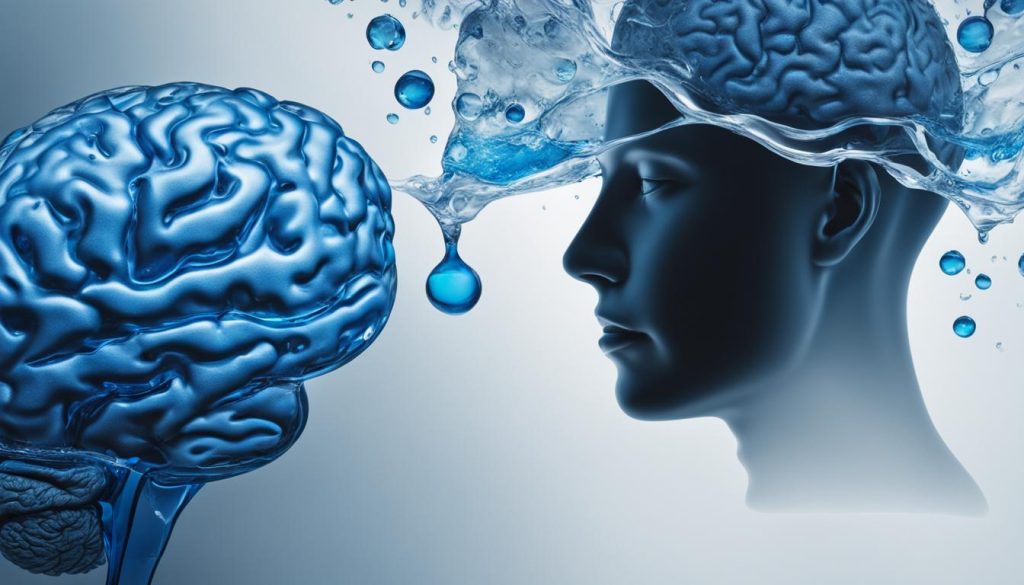As a health-conscious individual, I understand the importance of staying hydrated for overall well-being. Hydration plays a crucial role in maintaining good health and preventing dehydration, which can lead to various health issues. The benefits of drinking water are vast, ranging from detoxification to improved cognitive function. Let’s explore the significant impact of hydration on our health.
Key Takeaways:
- Staying hydrated is essential for maintaining good health.
- Drinking enough water helps prevent dehydration and its associated problems.
- Water plays a vital role in regulating body temperature, lubricating joints, and protecting sensitive tissues.
- Hydration is crucial for maximizing physical performance and thermoregulation.
- Proper hydration is essential for optimal brain function and cognitive performance.
The Physiology of Thirst and the Importance of Hydration
The physiology of thirst is a fascinating process that our bodies undertake to ensure hydration. Thirst is the body’s way of signaling that it needs water to function optimally. When the body’s water levels drop, a cascade of physiological mechanisms is triggered to maintain the balance.
Various studies have explored the hydration status in different populations, shedding light on the prevalence of plasma hypertonicity. Plasma hypertonicity refers to higher osmolality levels in the blood, indicating dehydration. One study conducted among community-dwelling older adults found a significant prevalence of plasma hypertonicity, highlighting the importance of addressing hydration in this age group.
Assessing hydration status is crucial for understanding individual needs. Techniques such as measuring urine osmolality can provide valuable insights into dehydration levels. Monitoring changes in urine osmolality can help individuals assess their hydration status and take appropriate measures to maintain proper fluid balance.
Research on the Physiology of Thirst
Over the years, scientists have delved deeper into understanding the physiological mechanisms of thirst. They have identified specific receptors in the body that signal the brain when water levels are insufficient. The hypothalamus, a key player in regulating thirst, receives signals from these receptors and triggers the sensation of thirst.
“Thirst is a remarkable physiological response that drives us to seek hydration and maintain our body’s delicate water balance.” – Dr. Jane Thompson, Water Physiology Expert
Studies have shown that voluntary dehydration, where individuals choose not to consume adequate fluids, can have detrimental effects on cognitive function. Even mild dehydration has been found to impair short-term memory, attention, and psychomotor skills. This emphasizes the importance of staying adequately hydrated to support optimal brain function.
The Importance of Hydration
Hydration is essential for numerous bodily functions. It plays a critical role in maintaining body temperature, lubricating joints, protecting sensitive tissues, and eliminating waste products through urination, perspiration, and bowel movements. Adequate hydration is vital for physical and cognitive performance, as well as overall well-being.
To ensure optimal hydration, it is recommended to drink water throughout the day, particularly when engaging in physical activity or when exposed to hot climates. Listening to the body’s cues of thirst is a crucial aspect of maintaining hydration levels.
The Physiology of Thirst Infographic
| The Physiology of Thirst |
|---|
 |
Hydration and Physical Performance
Staying hydrated is crucial for optimizing physical performance. Whether you’re an athlete striving for peak results or an individual engaging in regular exercise, adequate hydration plays a vital role in enhancing your physical abilities. Dehydration can have a significant negative impact on performance, especially during intense workouts or in hot climates.
Research studies have consistently shown that even mild dehydration can lead to a range of performance impairments. One of the key areas affected is thermoregulation, which is the body’s ability to regulate its temperature. When dehydrated, the body struggles to dissipate heat efficiently, leading to altered temperature control and increased risk of heat-related illnesses.
Additionally, inadequate hydration can negatively affect endurance and exercise capacity. Reduced motivation, increased fatigue, and decreased exercise performance are commonly observed outcomes of dehydration. The body’s ability to transport oxygen to the muscles and remove waste products is impaired when water levels are insufficient, which limits endurance and undermines overall exercise performance.
A proper balance of fluids, electrolytes, and nutrients is essential for maintaining optimal physical performance. Hydrating before, during, and after exercise sessions is highly recommended to replenish lost fluids and support optimal bodily functions. By staying adequately hydrated, you can help your body perform at its best and maximize your exercise potential.

Benefits of Hydration for Physical Performance
- Enhanced endurance
- Improved thermoregulation
- Reduced fatigue
- Optimized muscle function
- Maximized oxygen delivery to muscles
“Proper hydration is the key to unlocking your full physical potential.” – Dr. Jennifer Adams, Sports Scientist
Hydration Guidelines for Physical Performance
To optimize your hydration for physical performance, consider the following guidelines:
- Drink fluids regularly throughout the day, not just during exercise.
- Monitor your urine color to gauge your hydration status. Light yellow or clear urine indicates adequate hydration, while dark yellow or amber urine may indicate dehydration.
- Hydrate before, during, and after exercise. Aim to drink 16-20 ounces of water or a sports drink two hours before exercise, and continue drinking fluids at regular intervals during the activity.
- For prolonged exercise lasting longer than one hour, consider consuming electrolyte-rich beverages or sports drinks to replenish lost electrolytes.
By prioritizing hydration, you can optimize your physical performance, enhance endurance, and ensure efficient thermoregulation for overall well-being.
Hydration and Brain Function
Proper hydration is crucial for optimal brain function. When we don’t drink enough water, even mild dehydration can have negative effects on our mood, concentration, memory, and cognitive performance. Research has shown that fluid loss as small as 1-2% of body weight can result in decreased cognitive abilities, including attention, alertness, and short-term memory [1].
In fact, dehydration has been linked to headaches, especially in individuals who are prone to migraines. Studies have shown that increasing water intake can help relieve headache symptoms and reduce their frequency [2]. So the next time you feel a headache coming on, try reaching for a glass of water before opting for pain medication.
Additionally, staying properly hydrated can also help alleviate the unpleasant symptoms of hangovers. Dehydration is one of the main culprits behind hangover symptoms like fatigue, headache, and dizziness. By drinking water throughout the night and hydrating before bed, you can help mitigate the negative effects of alcohol on the brain and wake up feeling better the next day.
Moreover, maintaining adequate hydration levels can improve energy levels and reduce fatigue, leading to better overall brain function. When we’re dehydrated, we may experience decreased energy and increased feelings of tiredness and sluggishness. By drinking enough water throughout the day, we can boost our energy levels and improve our cognitive performance.
So, if you want to optimize your brain function, it’s essential to prioritize hydration. Keep a water bottle handy and make it a habit to sip on water regularly. Your brain will thank you!
“Staying properly hydrated is not only important for quenching our thirst, but it also has a profound impact on our brain function and cognitive performance.”
The Brain-Dehydration Connection
Dehydration affects brain function in multiple ways. One of the key mechanisms behind this is the impact of dehydration on the brain’s blood flow and oxygen delivery. When we’re dehydrated, our blood becomes more viscous, making it harder for it to reach the brain efficiently. This reduces oxygen availability and impairs brain function, leading to decreased cognitive performance and potential headaches.
Additionally, dehydration disrupts the balance of electrolytes in our bodies, affecting the electrical activity of neurons. Electrolytes, such as sodium and potassium, play a crucial role in maintaining proper communication between brain cells. When these electrolyte levels are imbalanced due to dehydration, it can impair brain function and contribute to cognitive decline.
How to Stay Hydrated for Optimal Brain Function
- Drink water regularly throughout the day, even when you’re not feeling thirsty. Thirst is a late sign of dehydration, so it’s essential to stay ahead of it.
- Monitor your urine color. Clear or light yellow urine is a good indicator of adequate hydration, while darker urine may signal dehydration.
- Increase your water intake during hot weather or when engaging in strenuous physical activity.
- Limit caffeine and alcohol intake, as they can contribute to dehydration.
- Include hydrating foods in your diet, such as fruits and vegetables with high water content.
By following these simple tips, you can ensure that you’re giving your brain the hydration it needs for optimal function, cognitive performance, and overall well-being.

References:
- Armstrong, L. E., Ganio, M. S., Casa, D. J., Lee, E. C., McDermott, B. P., Klau, J. F., … & Maresh, C. M. (2012). Mild dehydration affects mood in healthy young women. The Journal of nutrition, 142(2), 382-388.
- Spigt, M. G., Kuijper, E. C., Schayck, C. P., Troost, J., & Knipschild, P. (2005). Increasing the daily water intake for the prophylactic treatment of headache: a pilot trial. European journal of neurology, 12(9), 715-718.
Hydration and Digestive Health
Ensuring adequate hydration is essential for maintaining digestive health. Low water consumption has been identified as a risk factor for constipation in individuals of all ages. Studies have shown that increasing fluid intake, including drinking water and consuming high water content foods, can help prevent and relieve constipation. Hydration plays a crucial role in keeping the digestive system functioning properly.
Furthermore, staying hydrated is also important for preventing urinary stones. By diluting the concentration of minerals in the urine, proper hydration reduces the risk of stone formation. Dehydration can lead to the accumulation of minerals and the formation of stones in the urinary tract. Thus, maintaining optimal hydration levels can help support urinary tract health and prevent the discomfort associated with urinary stones.
| Benefits of Hydration for Digestive Health | Key Points |
|---|---|
| Prevents constipation | Low water consumption can contribute to constipation. Adequate hydration helps promote regular bowel movements and softer stools. |
| Supports urinary tract health | Proper hydration helps dilute minerals in the urine, reducing the risk of urinary stone formation. |
Remember to drink enough water throughout the day and incorporate hydrating foods into your diet to support optimal digestion and prevent digestive issues. Maintaining good hydration habits is crucial for overall digestive health.
Hydration for Weight Management
When it comes to weight management, staying hydrated can make a significant difference in achieving your goals. Water, the ultimate calorie-free beverage, not only quenches your thirst but also contributes to weight loss.
One way water aids in weight management is by increasing the feeling of satiety. By drinking plenty of water throughout the day, you can help reduce calorie intake by feeling full and satisfied. This can be particularly helpful when trying to control portion sizes and avoid unnecessary snacking.
Furthermore, research suggests that increasing water intake can have a subtle impact on your metabolic rate. Although the effect may be modest, the simple act of staying hydrated can slightly boost calorie burning, potentially aiding in weight loss efforts.
Incorporating water as part of a healthy diet and weight loss plan is essential. Drinking water before meals can help control appetite, curb cravings, and support portion control. By making water your go-to beverage, you can reduce overall calorie consumption and maintain a healthier weight.
FAQ
Why is staying hydrated important for maintaining good health?
Staying hydrated is important for maintaining good health because it prevents dehydration, which can lead to problems like unclear thinking, mood changes, overheating, constipation, and the formation of kidney stones. Water plays a vital role in regulating body temperature, lubricating joints, protecting sensitive tissues, and eliminating waste through urination, perspiration, and bowel movements.
How is dehydration assessed in different populations?
Dehydration levels can be assessed using techniques such as measuring urine osmolality. Various studies have examined the hydration status in different populations, including older adults and school children, and found a high prevalence of plasma hypertonicity among community-dwelling older adults.
How does hydration affect physical performance?
Hydration is essential for maximizing physical performance. Dehydration can impair performance, especially during intense exercise or in hot climates. Even mild dehydration can lead to altered body temperature control, reduced motivation, increased fatigue, and decreased exercise performance. Hydration also plays a crucial role in thermoregulation, preventing heat-related illnesses and impacting temperature regulation during exercise.
How does hydration impact brain function?
Proper hydration is crucial for optimal brain function. Mild dehydration can impair mood, concentration, memory, and cognitive performance. Even minor fluid loss can lead to headaches, especially in those prone to migraines. On the other hand, drinking enough water can help relieve headaches and hangover symptoms. Adequate hydration can also improve energy levels and reduce fatigue.
What is the connection between hydration and digestive health?
Adequate hydration is important for maintaining digestive health. Low water consumption is a risk factor for constipation in individuals of all ages. Increasing fluid intake, including drinking water and consuming high water content foods, can help prevent and relieve constipation. Staying hydrated can also help prevent urinary stones by diluting the concentration of minerals in the urine, reducing the risk of stone formation.
Can drinking water help with weight management?
Drinking plenty of water can aid in weight management. Water is calorie-free and can increase satiety, leading to reduced calorie intake. Increasing water intake can slightly boost metabolism, resulting in increased calorie burning. Drinking water before meals can help control portion sizes and reduce overall calorie consumption, making it beneficial for achieving weight management goals.




